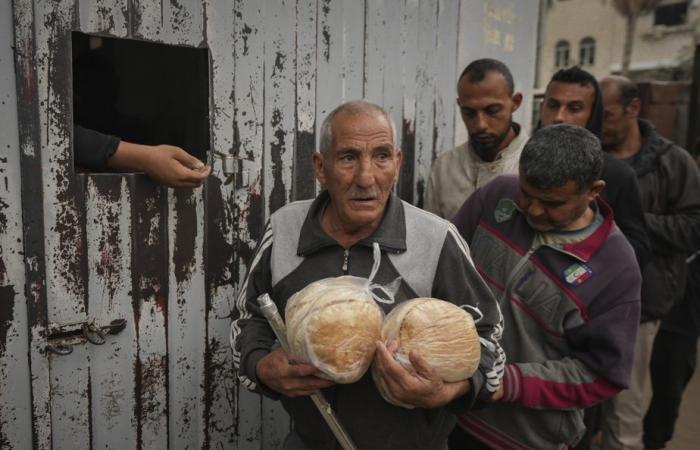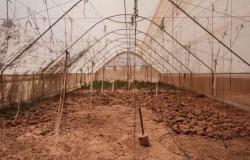Famine looms in Gaza, where the makeshift tents are no longer holding up. Humanitarian aid hardly comes in, blocked by endless administrative formalities from Israel. All this, in front of the world, denounce the NGOs, with Oxfam calling it “ethnic cleansing”.
Published at 5:00 a.m.
What you need to know
Oxfam denounces “ethnic cleansing” of Israel in Gaza, in front of an indifferent, if not “complicit” international community.
Trucks are blocked by Israel, losses of medicine and food are increasing and famine threatens Gaza, which Israel denies.
Washington gave Israel until November 12 for humanitarian aid to arrive. Since then, the situation has only gotten worse.
“Survival conditions are dwindling for the 65,000 to 75,000 people still there” in the north of the Gaza Strip, noted this week by UNRWA, the United Nations agency dedicated to the Palestinians.
In an October 13 letter, the United States gave Israel 30 days to ensure that a minimum of 350 trucks of goods enter the Gaza Strip each day. Nothing has changed.
Gaza, cut off from the world
In a telephone interview from Jerusalem, Claire Nicolet, head of mission for Doctors Without Borders in Palestine, explains that “we would need 500 trucks per day. In October and November, for all humanitarian aid, we are at 39 trucks per day.”
She makes no secret of her frustration.
Barely 76 kilometers separate Jerusalem and Gaza City, says Mme Nicolet.
In Jerusalem, the market stalls are full, life is in full swing. In Gaza, cut off from the world, stomachs are empty.
“Logistically, it should be very simple,” explains M.me Nicolet.
This is not about those missions “where it sometimes takes a week or two to get there” by road.
No, Gaza is almost around the corner. The trucks piling up in Egypt are full of food and medicine. Everything is there, but most of the basic necessities – including several medicines which must remain cold – are lost, thanks to forms to be filled out and endless Israeli checks, explains Mme Nicolet.
NGOs must request authorization after authorization. The pallets of the trucks are inspected, the trucks turned away.
Sending scalpels – essential for surgical interventions – or hospital beds is extremely complicated. “For everything made of metal, you have to make additional requests and authorizations sometimes take two or three months to arrive. »
The same goes for water pumps or their replacement parts, continues Mme Nicolet.
No respite
Israel fears that a quantity of goods could be used for military purposes, “in any case, that is the official excuse,” notes Claire Nicolet. Is this true? We can imagine all sorts of things, but what is certain is that the reality is extremely complicated.”
The colder weather and rains have arrived, people “now have their feet in the water. We received photos of destroyed tents from our teams.”
And the attacks give no respite to the Palestinian people. “As I speak to you, a hospital is surrounded by active fighting,” observes M.me Nicolet.
Oxfam paints the same portrait. For 50 days, almost all aid has been blocked, according to this NGO.
“Ethnic cleansing”
“Our personnel in Gaza have been desperately trying to reach starving civilians for almost two months, but have been blocked by the Israeli army. We know that many children are trapped and will die of hunger,” said Amitabh Behar, executive director of Oxfam International.
He bluntly denounces an “ethnic cleansing of the north of the Gaza governorate by Israel”, which “acts with complete impunity”.
“The international community remains powerless and, in some cases, totally complicit,” says Amitabh Behar, believing that Israel “uses hunger as a weapon of war against thousands of men, women and children […] ».
Inevitably, in the face of so many hungry people, said Léa Pelletier-Marcotte, a political analyst at Oxfam, in an interview, the looting of trucks increases, further complicating the small distribution of food.
Gazans, especially those in the North, “are cut off from the world. Up to 70,000 people are trapped.”
“There were orders to evacuate the northern area, people were told that if they did not leave they would become civilian targets. [Les forces israéliennes] told them that if they headed towards Gaza City, they would find food there. But there isn’t one. Our employees eat one meal a day, consisting of rice or bread. »
« Imminent famine »
On November 9, the Reuters news agency reported that according to the independent Famine Review Committee (FRC), there is “a high probability of imminent famine in some areas.”
The FRC then declared that “immediate action, in the days to come and not in the weeks to come, is required from all actors who participate directly in the conflict, or who have an influence on its conduct, to avoid and alleviate this catastrophic situation.”
In a letter dated October 13, the United States gave Israel until November 12 to improve the humanitarian situation in Gaza, failing which their military aid, they said, would be reduced.
Israel rejected the FRC’s conclusions out of hand. Daily life Times of Israel reported a November 9 statement from the military, according to which “researchers unfortunately continue to rely on partial and biased data as well as superficial sources with vested interests in the issues.”
When is there famine? According to the United Nations, it occurs when there is extreme lack of food, acute malnutrition among children and when certain mortality thresholds are reached.






